More than 450 companies have announced their departure from Russia since Moscow invaded Ukraine last month, according to a report released on Friday by the Yale School of Management.
From Huawei to Knauf
Although foreign companies are rapidly leaving, some “have continued to operate in Russia undeterred,“ noted the authors Jeffrey Sonnenfeld, a professor of management practice at the school, and Steven Tia, director of research for the Yale Chief Executive Leadership Institute.
They outlined five categories to classify companies active in Russia, one of which is titled “Digging in – Defying Demands for Exit: companies defying demands for exit/reduction of activities.”
Some of the companies that are “digging in” are the Chinese telecommunications giant Huawei, the US Koch Industries, French multinational retail firm Auchan, Turkish Airlines, the Austrian Raiffeisen Bank International and the German construction company Knauf.
The Yale professors issued the defiant companies a grade of F.

The other four classifications are:
- Withdrawal – Clean Break: companies completely halting Russian engagements/exiting Russia;
- Suspension – Keeping Options Open for Return: companies temporarily curtailing operations while keeping return options open;
- Scaling back – Reducing Activities: companies scaling back some business operations while continuing others;
- Buying Time – Holding Off New Investments/Developments: companies postponing future planned investment/ development/ marketing while continuing substantive business.”
“When this list was first published the week of February 28, only several dozen companies had announced their departure,” the authors said.
“Hundreds of companies have withdrawn in the days since, and we are humbled that our list helped galvanize millions around the world to raise awareness and take action.”
A much-cited "hall of shame”
Writing for Fortune magazine on March 17, Sonnenfeld and Tia said that “our list provided a much-cited ‘hall of shame’ that guided the voices of employees, customers, and investors seeking to show their disapproval.
“We have been told that our list of companies leaving and staying in Russia did provide courageous CEOs with the confidence to execute bold pronouncements,” they noted. “Plus it reinforced prospectively courageous CEOs with the peer affirmation they sought, offering ‘benchmarking’ to help them persuade their anxious, controversy-averse boards to join the stampede of responsible business leaders pulling out of Russia.”
“The firms that are divesting massive assets – such as BP, Exxon, and Shell – deserve great recognition,” Sonnenfeld and Tia wrote.
“Companies that remain engaged in Russia have unconsciously echoed the strategic defense of those German executives from Hoechst AG I.G. Farben, and Flick convicted at Nuremberg or the misguided leaders of Woolworth’s, Texaco, Royal Dutch Shell, and others for their ‘constructive engagement’ with Hitler’s Germany into the Second World War,” wrote the academics.
On the same day that the Fortune article was published, The Sun headlined its article “EU’s Shame: France and Germany dodged Russia arms embargo to sell weapons to Putin – that are now being used to slaughter Ukrainians.”
According to the newspaper, “Paris sent bombs, rockets and explosives, as well as thermal-imaging cameras for 1,000 tanks and infra-red detectors for jets. Berlin sold what it called ‘dual-use equipment,’ – including rifles, “special protection” vehicles and icebreaker vessels – and Rome provided armored cars.”
Ten EU states “sold hundreds of millions of pounds of military kits to Russia between 2015 and 2020,” it wrote.
